The human condition is constantly influenced by many factors. Many people experience this phenomenon of constantly itching their head. The reasons for this phenomenon may be different. In any case, measures must be taken to eliminate this unpleasant symptom. Details are presented in the article.
Why does my head itch? The reasons may be related to the appearance of lice. But this happens only in advanced cases. Inflammation and irritation on the head is usually observed in young children who do not like water procedures, and unscrupulous parents do not bathe them. It is easy to detect traces of lice, because pests leave stains. Lice usually form where there is dandruff.
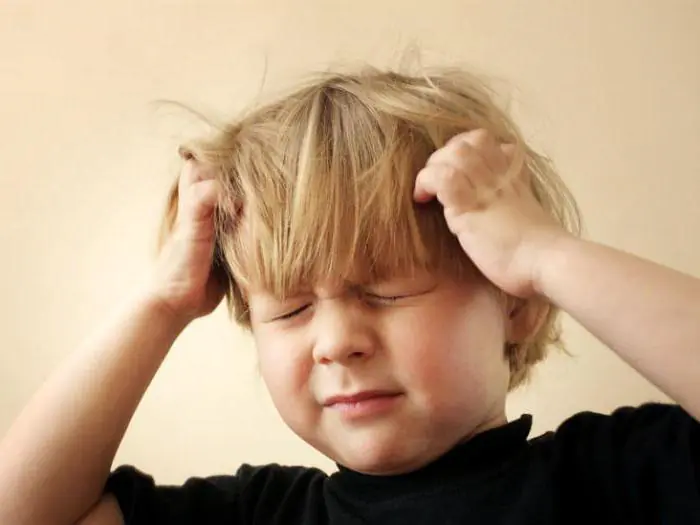
If a person takes care of hygiene, then the possibility of such a problem occurring is minimal. If you have any doubts about this, you should ask a loved one to examine your head for parasites. You can see them with your own eyes or with a magnifying glass.
Allergy
“Why does my head itch, it’s clean, right?” - you can often hear exactly this question from people. If itching occurs after washing your hair, then the shampoo is probably not suitable. In this case, you need to buy a pharmaceutical remedy against this symptom.
Often a person becomes allergic to certain components that are included in personal care products. Allergens include sodium and sulfate compounds. In this case, it is necessary to change the shampoo, otherwise, with an allergy, red spots may form on the head, and dandruff will be released in even greater quantities. Inflammation and dandruff appear when the scalp is very dry, and a person uses shampoo for oily hair.
Chemical damage
If your head itches, the reasons may lie in chemical damage. Usually this problem occurs among the fair sex after extensions and coloring. Itching occurs due to the influence of many chemical components on the skin and hair. In this case, it is necessary to determine which of the remedies causes the allergy. If it is detected, you should stop using it.
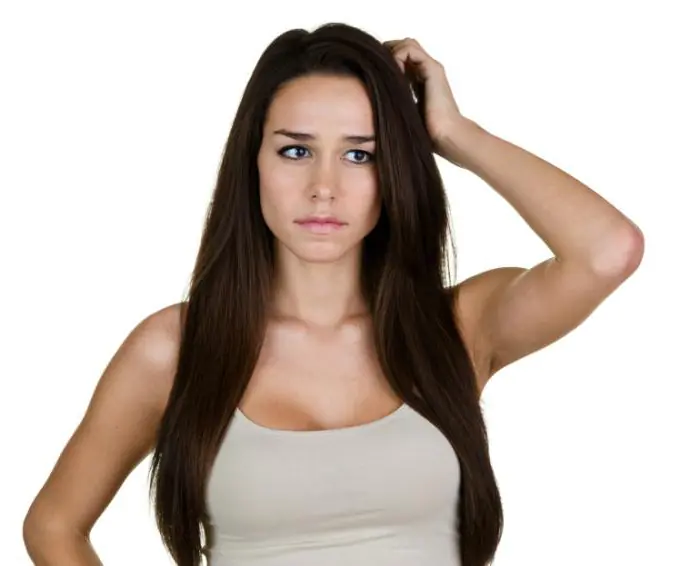
It is necessary to pay attention to the composition and compare it with other products used. Often allergies are caused by ordinary henna. After contact with the head, it negatively affects the epidermis. The allergen may be ammonia, which is an aggressive agent for the epithelium.
Switching to products from another company usually helps. Therefore, if shampoo makes your head itchy, you need to try a different wash. To get rid of unpleasant sensations, you need to use a soothing gel, lotion, or balm. Various herbal tinctures are suitable.
Disease
Constantly itchy head due to illness. Hair loss is associated with a deficiency of vitamins and microelements for hair and skin. The bulbs weaken, the strands become thinner and break, and then fall out.
Itching may appear due to a skin disease in the form of a fungus, ringworm. The disease can occur in people of any age and gender. Typically, sores appear as frequent spots on the skin. The affected area may not be the head. The disease can manifest itself throughout the body, especially in friction areas such as the knees or elbows. The spots turn white and peel, causing the person to feel severe itching. In this case, you should consult your doctor about treatment methods.
Seborrhea
If your head is constantly itching, the reason may lie in the presence of seborrhea. This disease occurs due to severe oily skin. Then dandruff appears in larger quantities. In addition, peeling is observed. It could be dermatitis or psoriasis. You should not treat the disease at home; it is better to consult a doctor immediately.
The causes of this phenomenon are constant stress and depression, poor nutrition, disruptions in the immune system or hormonal system. If your skin is sensitive, then even washing with hard water can cause this unpleasant symptom. The head also constantly itches due to a genetic factor, allergies or health problems.
Allergy to paint
Your head may itch from using low-quality paint or a composition containing ammonia or hydrogen peroxide. Therefore, it is important to control what the master will use for painting. Ammonia-free paints or tinted shampoos are more suitable. Before the procedure, it is necessary to perform an allergy test.
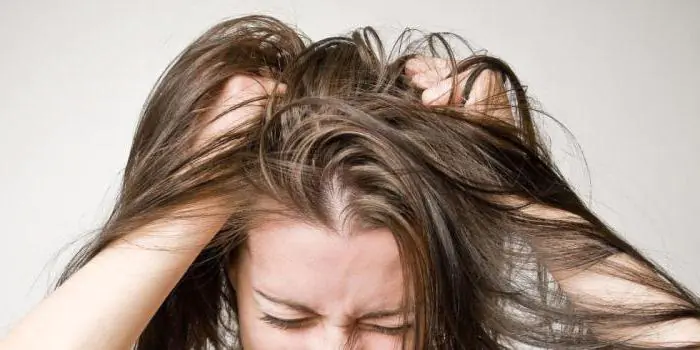
Poor nutrition
Itching may occur due to consumption of large quantities of sweet, spicy, smoked, canned food and coffee. Overeating these products necessarily affects the skin, causing dermatitis, eczema, acne, and rashes.
With these skin manifestations, itching and scratching are observed in the areas of the rash. Therefore, it is necessary to exclude the consumption of junk food, it is necessary to consume more plain water, lean foods without spices. After this, the itching may go away on its own.
Inappropriate headgear
If it is tight or synthetic, then unpleasant sensations will definitely appear on the head. Debate only makes the situation worse. In this case, you need to replace the headdress with a pleasant one made of natural material. In addition, they must be worn at a certain temperature; the scalp should not be overheated or overcooled.
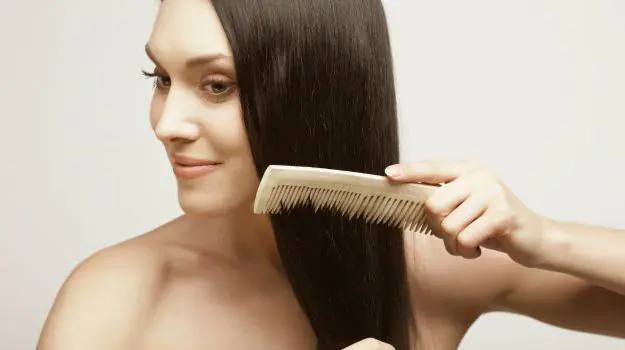
Itchy scalp can also occur due to:
- blood circulation disorders;
- gastrointestinal diseases;
- sedentary lifestyle;
- frequent use of a hair dryer, curling iron, overexertion.
From nerves
Can your head itch because of nerves? Stress and hair are interconnected. Therefore, itching is likely to occur for this reason. During stress, changes are observed in the activity of the immune system, which begins to work actively. This activation can cause an attack on one’s own cells.
Because of this, in some systems there is an imbalance between protective and aggressive factors. Due to damage to the scalp tissue, irritation of the nerve endings that transmit a signal of damage to the brain is observed. The nervous system understands this as itchy skin. This damage to the hair follicles can lead to hair loss.
When is treatment required?
It is possible and necessary to eliminate dandruff, itching and other skin problems. You should consult a doctor if you notice:
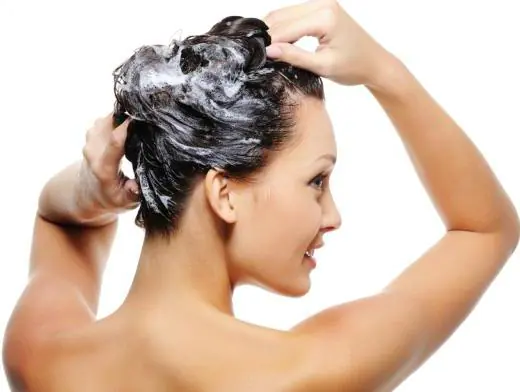
- scabies;
- excessive oily scalp;
- peeling of the skin;
- acne.
If your head itches in one place or in different places, you can use shampoos and medicated masks at home. Nowadays, various effective remedies against specific problems are sold.
How to restore hair?
Stress can significantly affect the condition of your hair. How should recovery be performed? The following recommendations will help in this matter:
- Elimination of factors that damage the scalp and hair. You should not use dyes, perms, use a hot hair dryer or straightener.
- Using methods that improve blood flow to the scalp. This applies to the laser comb and darsonval. The procedures activate blood flow and improve hair growth.
- Self-massage is useful.
- You should use a soft comb, preferably a wooden one with a low frequency of teeth.
Following these recommendations will help restore the amount of hair on your head faster.
Shampoos
If your scalp itches, what should you do? Special shampoos relieve this unpleasant symptom:
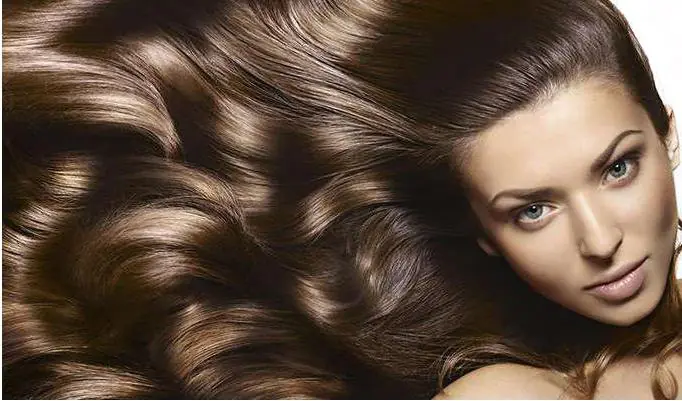
- For dandruff. But it can only be used if there is no allergy.
- From fungus and lichen. You should purchase products with zinc and climbazole.
- From itching and burning. Mousses and gels with salicylic acid and tar are suitable.
- From seborrhea. It is necessary to use medicinal masks and shampoos with tar, sulfur, antibacterial components and microelements.
- From irritation. It is better to choose shampoos with chamomile, oak bark and other medicinal herbs and plants.
Use of medications
If your head itches, treatment can be done with medications prescribed by your doctor. They should not be used arbitrarily. Usually, for dandruff and seborrheic dermatitis, vitamin complexes with vitamins A, E, B and preparations with fungi are prescribed.
If depression and stress constantly accompany you, you need to relax and calm down. In this case, you need to use antidepressants, for example, Novopassit and tincture of motherwort and chamomile. If the hormonal system is normal, it is necessary to take the drug to restore the balance between male and female hormones.
Traditional medicine
It is not necessary to use medications, since there is traditional medicine. Its products can quickly improve the condition of the scalp and hair:
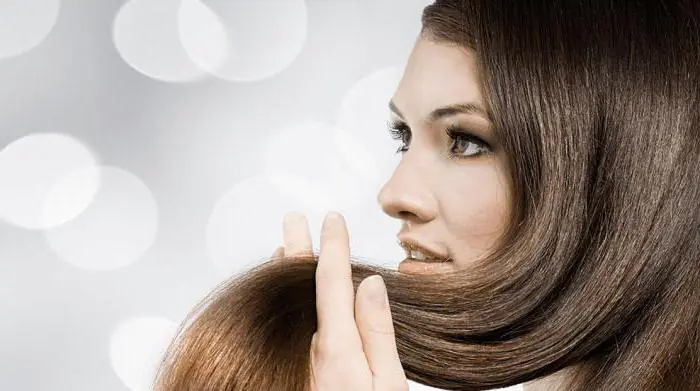
- Massage. The procedure restores blood circulation and eliminates unpleasant symptoms painlessly.
- Herbal decoctions. Oak bark, chamomile, and nettle are suitable for treatment. They can be used as a rinse after washing your hair.
- Garlic and onion juice. The acids and sulfur present eliminate flaking, dandruff, and itching. You will need garlic or onion juice, which must be mixed with lemon juice (in an amount of 1:1). You also need to add a little oil, preferably olive. Apply the finished mixture to damp strands and scalp for half an hour. Then everything should be washed off with warm water. If desired, add a few drops of lemon juice to the water.
- Apple mask. It will help you quickly get rid of itching. You will need a medium-sized apple, which must be grated and then applied to your hair and scalp. Then the heads should be wrapped in a warm towel for half an hour. Rinse off the product with warm water and shampoo. The procedures can be performed 2 times a week, which will provide excellent results.
- Onion peel. You will need 1 tbsp. this product, which must be placed in a saucepan and pour boiling water (1 liter). The finished mixture should be simmered over low heat for 1 hour. The decoction is used to remove itching for rinsing after shampoos. To achieve the best effect, you need to perform the procedures 2-3 times a week.
Prevention
It is better to prevent any disease than to treat it. To avoid itchy scalp, it is important to follow simple rules:
- Use high-quality shampoos, conditioners, and lotions that do not contain harmful allergens.
- It is important to use only your own styling tools - combs, hairpins, curling irons, stylers.
- In hairdressing salons and salons, it is necessary to monitor the processing of tools.
- It is necessary to adhere to an active lifestyle, eat right, and eliminate bad habits.
- It is important to remember that you should not self-medicate.
Thus, your head can itch due to various factors. However, there are many remedies to eliminate this unpleasant symptom. And if you follow the rules of prevention, you can prevent the occurrence of itching and other ailments of the scalp.

Itching and many accompanying troubles can be caused by a huge amount reasons. To accurately establish the source, it is best, of course, to visit a doctor, but this is where the problem arises - which specialist should I make an appointment with?! Or go to everyone in a row - an inspection is never superfluous! Let's figure out what the reasons are and which doctor should be visited.
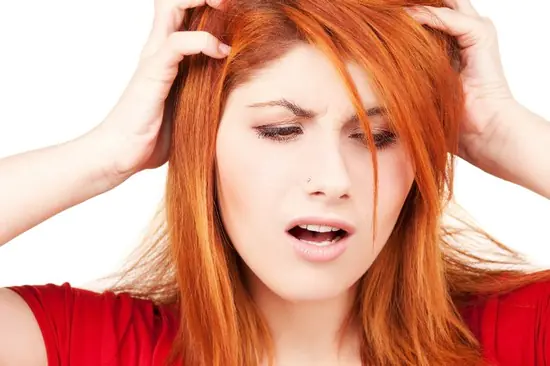
For severe, persistent itching of the scalp Necessarily consult a doctor! Don't delay! The sooner you contact, the less consequences there will be!
Probable Causes
- Seborrhea, dandruff
Improper functioning of the sebaceous glands leads to major hair problems. One of the very unpleasant ones is dandruff (seborrhea), accompanied by unbearable itching and damage to the skin. And also shoulders and backs covered with white scales. It is these scales that are the source of itching; they are the ones that irritate the skin.
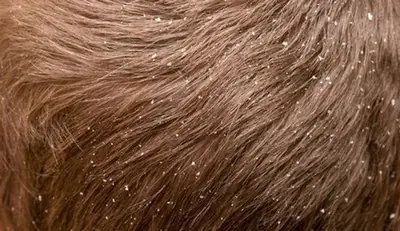
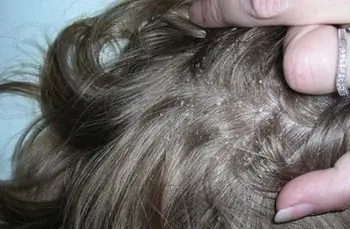
In mild cases, dandruff can be easily treated on its own at home. It is better to treat more complex cases together with a trichologist, and approach this comprehensively and tune in to the duration of the process.
- Dry scalp
Again, improper functioning of the sebaceous glands and some other reasons lead to dry hair and scalp. The glands are actively trying to relieve dryness and protect weakened skin from the negative effects of the environment and thereby cover the entire surface with a layer of sebum. The hair begins to get dirty quickly, a lot of dirt sticks, bacteria and microbes develop strongly. You may mistakenly suspect that you have oily skin and oily hair type. Frequently washing your hair dries out your skin even more, making cracks and scratches itchy. After washing, everything becomes fluffy and electrified, hairs split and break off.
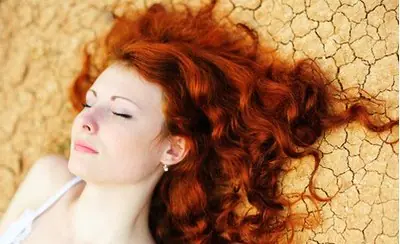
Moisturizing masks, replenishing vitamins and microelements in the body, proper and healthy nutrition, following the rules of washing and drying, and protecting curls from the sun, wind, and frost can cope well with this problem.
- Fungal infection
These are serious diseases that require mandatory treatment. In addition to constant frequency, plaques (lichen) also appear on the skin, which look very repulsive. It is best to undergo a course of treatment in a medical facility under the supervision of a dermatologist, but if for some reason this is not possible, then try to relieve symptoms with tea tree oil wraps and special antifungal shampoos.
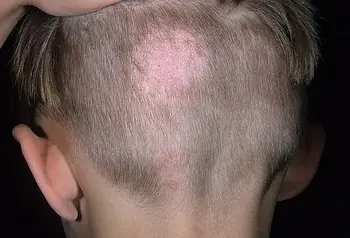
- Parasites (lice, mites...)
Another very serious lesion, which also requires mandatory and immediate treatment (you must visit a dermatologist). Most often these are lice. A louse can jump over anywhere, especially where there are large crowds of people or large groups of employees. You can detect it under a magnifying glass by carefully examining the scalp (it’s better if a doctor does this). It is not possible to detect a tick-borne infection at home.
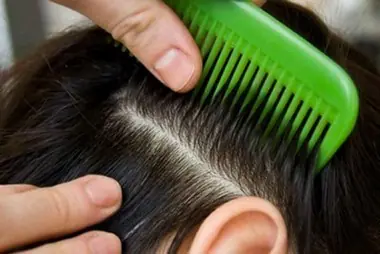
Inspection for lice
Treatment for head lice is quite simple and does not take long. Special shampoos and some folk remedies will do the trick.
Perhaps one of the most common sources of skin itching, and all because recently an incredible number of new allergic reactions have appeared. The main ones are reactions to food. Also, many today are faced with allergies to hair care products (shampoos, balms, masks, styling products...) and decorative cosmetics. It is usually accompanied by rashes, redness, itching, and sometimes swelling.
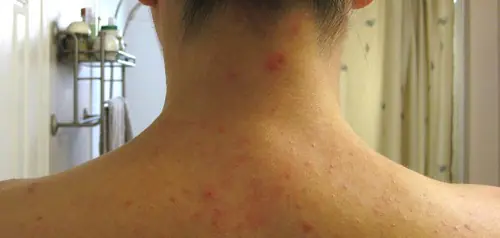
Allergies can also occur when changing your usual hair care product. If returning to the old remedy does not solve the allergy problem, then you should contact a trichologist.
The solution to the problem is to find the allergen and, of course, eliminate it. The best place to do this is at an allergist's office.
- Allergy to paint
This also happens quite often, especially if the artist used low-quality paint or paint containing ammonia or hydrogen peroxide. There is only one way out: be sure to control what exactly the artist paints you with and choose ammonia-free paints or tinted shampoos for coloring. In addition, it is advisable to test for allergic reactions before the procedures.
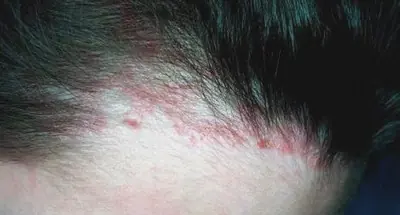
- Allergy to powders
Washing powders and fabric softeners contain many different chemical components. Any of them can cause skin irritation, and, accordingly, allergies and itching.
The source of many different problems with the body is nervous tension, stress, depression, and neuroses. Hair and scalp are also affected. Stress can cause a change in hair type, disruption of the sebaceous glands, spasms of blood vessels, and problems with blood microcirculation. Against this background, metabolism suffers greatly and skin irritation occurs.
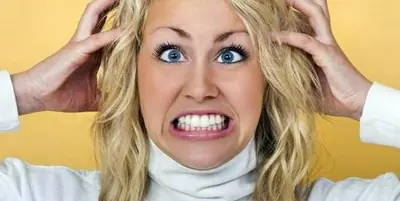
To relieve this irritation, first of all, you need to eliminate stressful situations and calm your nerves, take a course of sedatives (prescribed by a neurologist upon treatment), and massage the scalp and cervical spine.
- Poor nutrition
Excessive consumption of sweets, spicy foods, coffee, smoked foods, canned food, etc. These are not very healthy foods and overeating them inevitably affects the skin: dermatitis, eczema, acne, rashes. These skin manifestations are always accompanied by itching and severe scratching of the rash. Coping with this problem is quite simple: eliminate “junk” foods for a while, drink more plain water, consume lean foods with a small amount of spices. Itching and rashes will go away quickly!
- Wrong headdress
Tight and synthetic headgear often causes discomfort on the head. The debate makes the situation even worse. You want to scratch your head all at once and as quickly as possible. There is only one way out - to immediately change the headdress to a more pleasant one, made of natural material, and in addition, different hats should be worn at a certain temperature (hair care in winter) and try not to overheat the scalp, as well as not to overcool.
In addition to these main reasons, there are also secondary ones. These include:
- disturbances in blood circulation;
- gastrointestinal diseases;
- passive lifestyle;
- frequent use of hair dryers and curling irons. ;
- overvoltage .
Of course, there are many reasons and it would take a very long time to describe each one. If your reason is not among the main ones, then it’s worth looking with a specialist for more rare ones. But it is imperative to find the reason why the scalp itches, since this can be a symptom of a serious illness, and going to the hairdresser becomes problematic.
When, at first glance, your head begins to itch for no reason, there is cause for concern. Often the worst comes to mind, but the reasons may be completely harmless. Or, conversely, itching can be a symptom of serious diseases. Why does my head itch and what can I do about it? Everyone should know the answers to these questions in order to react in time and help themselves.
Reasons why your head itches if there are no lice
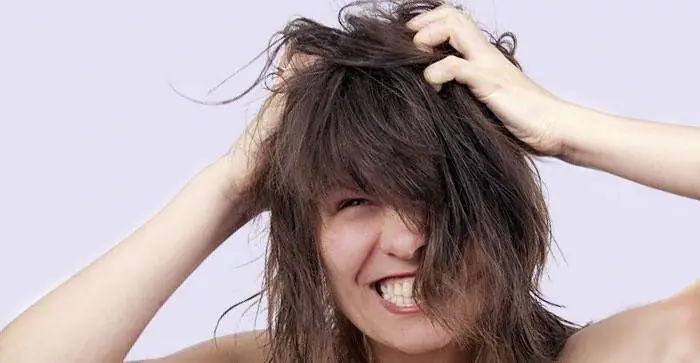
The first thing most people associate with an itchy scalp is lice. However, a person who takes care of himself and follows the rules of hygiene has a very low probability of becoming infected with these parasites. By examining yourself or asking a loved one about it, it is easy to exclude the presence of lice; their presence is detected with the naked eye or with the help of a magnifying glass. And if you are convinced that there are no parasites, it is worth considering other possible causes of itching.
Why is my scalp dry and itchy after washing?
Itching that occurs after washing your hair indicates that the composition of the shampoo is not suitable for the person. This may be due to:
- That you are allergic to the ingredients of the shampoo, conditioner or hair rinse. This reaction often occurs if the shampoo contains sodium lauryl sulfate or sodium laureth sulfate. If this is the case, you should switch to shampoos with a more gentle composition.
- That you are allergic to the softener or powder used to wash towels. This factor is possible if the appearance of itching coincides with testing of new products that are unfamiliar to a person. Often returning to already proven remedies leads to the disappearance of unpleasant sensations.
- That the wrong type of shampoo was chosen. With increased dryness of the scalp, fat secretion is excessive, but has a different composition. Often in these cases, people mistakenly choose shampoo for oily hair to degrease the roots, but such products dry out the skin even more, worsening the situation. Itching, burning, and brittle hair occur.
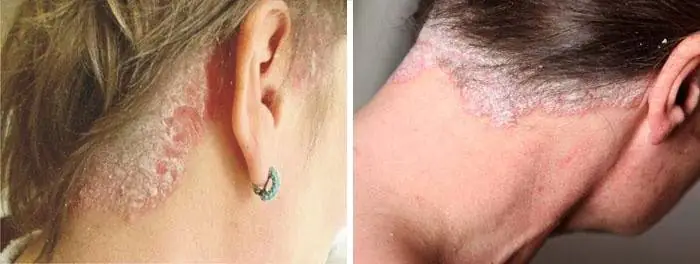
With the appearance of irritation after hair coloring
After hair extensions or coloring, you may experience unpleasant burning and itching sensations. If your scalp itches in this case:
- The coloring product is not suitable for a person due to an allergy to the ingredients that are included in its composition. You should abandon it, switch to products from another manufacturer, and after dyeing your head, lubricate your head with any soothing, anti-inflammatory agent (lotion, balm or decoction based on chamomile, calendula, string).
- Hair dye contains too aggressive components that excessively dry the scalp, cause allergic reactions, and have a negative effect on the epidermis. Such irritation and itching often occur after henna. In these cases, women are advised to switch to more gentle products, such as tinting shampoos or dyes with low ammonia content.
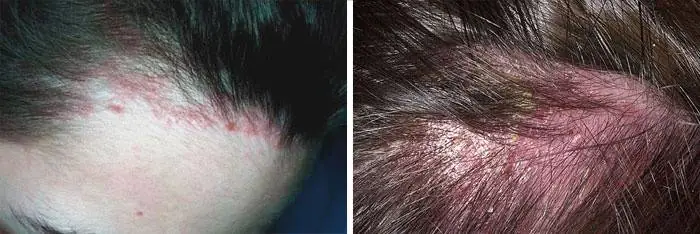
Itchy head and hair loss
If your scalp itches and hair falls out, the reason lies in one of the following problems:
- Vitamin deficiency often causes not only itching, but also hair loss, which results in weakening of the hair follicles and fragility.
- The appearance of all kinds of fungal diseases and microorganisms in a child or adult (for example, ringworm) leads to the appearance of flaking on the scalp, their loss and severe itching, which is often impossible to tolerate. You cannot treat this problem yourself; it is necessary to find out the nature of the disease, because it may be part of a larger, complex disease that reduces a person's overall immunity.
- Violation of the proper functioning of internal organs leads to a deterioration in the flow of all processes in the body, and this affects the quality of the hair, causes fragility, oiliness of the hair, and, as a result, is characterized by hair loss and itchy scalp.
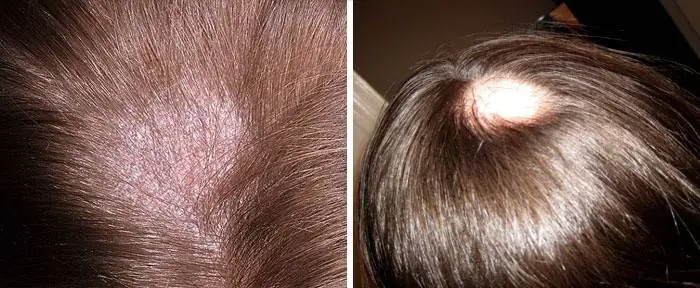
With the appearance of flaking and dandruff
- Severe itching with accompanying dandruff and increased oiliness may indicate the presence of a disease such as seborrhea of the scalp (increased sebum production, flaking) or seborrheic dermatitis (flaking and red spots on the skin). These are serious diseases that are complex in nature. They are difficult to cure at home, so if you suspect seborrhea, you should definitely contact a dermatologist or trichologist.
- Stress, nervous exhaustion, poor nutrition, weakened immunity, and hormonal imbalances in an adult often act as catalysts for the development of seborrhea. But these factors themselves can cause itching, dandruff, and mild to moderate hair loss. Even from water of increased hardness, from sweets consumed in excessive quantities, a similar problem can arise. In this case, the head itches all the time, the appearance of discomfort and itching is difficult to correlate with a specific event (for example, washing your hair, coloring).
- The presence of dandruff, which does not accompany seborrhea, but is an independent disorder, leads to the appearance of mild and moderate itching. The reasons for the peeling of epidermal scales often lie in genetic predisposition, general health problems (for example, metabolic disorders) or are a consequence of the negative impact of external factors (for example, allergies to hair care products). Dandruff, like other diseases, needs to be treated.
- Psoriasis is a severe autoimmune skin disease that is catalyzed by severe stress, unbalanced nutrition, and impaired immunity. It looks like flaky areas with a tendency to increase in area. When lesions appear on the scalp, severe itching and discomfort will be felt.
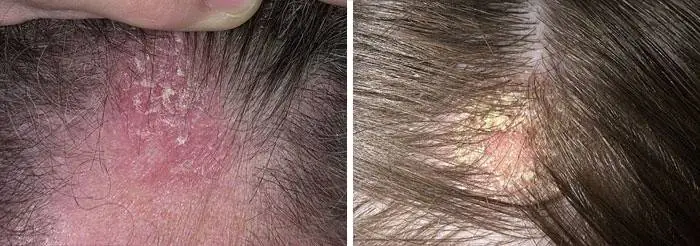
What to do and how to treat if your scalp itches
If you experience discomfort, itching of the head, excessive and atypical greasiness of the epidermis, lesions on the skin, pimples, you should definitely consult a dermatologist or trichologist. They will conduct all the necessary tests, determine the cause of the symptoms, the source of the problem and prescribe the appropriate treatment. However, in some cases, when it is not possible to urgently go to the hospital, and the itching is very intense, it is worth using remedies that will help improve your well-being.
Shampoos and masks for dandruff and itching

The simplest remedy to relieve the itching and burning sensation is special shampoos. Based on the symptoms, you can use remedies against:
- dandruff (in the absence of allergies to such);
- fungi, lichen (antifungal agents, for example, climbazole, zinc pyrithione);
- itching of nervous or allergic etiology (lotions containing salicylic acid, tar in combination with general therapy);
- seborrhea - medicinal masks (containing ketoconazole, tar, sulfur, salicylic acid, antibacterial substances);
- irritations - soothing shampoos that relieve redness and inflammation (based on chamomile, string, and other herbs).
Drug treatment
Depending on the cause and nature of the disease, local treatment of itching is often supplemented with medications (they are prescribed exclusively by a doctor), which have different effects and directions:
- for seborrhea - these are vitamins A, E, B2, antifungal drugs;
- for increased levels of stress - remedies for nerves: sedatives, antidepressants (Alora, Novo-Passit, infusions of chamomile, motherwort);
- for hormonal imbalances - drugs that restore the balance of male and female hormones in the human body;
- in the presence of fungal diseases - remedies for the fungus that causes the infection;
- for allergies - antihistamines (tavegil, suprastin, diazolin); in severe forms - corticosteroids;
- For vitamin deficiency, vitamins A, B, and C are prescribed.
Folk remedies
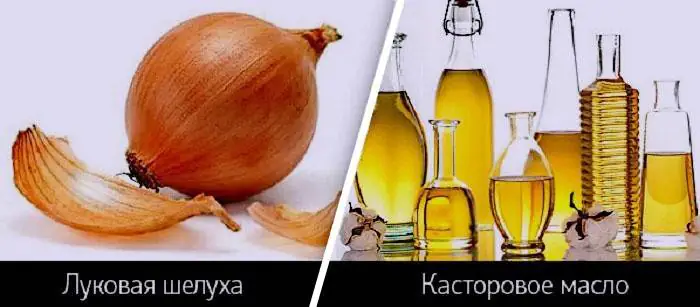
The intensity of itching is reduced by the following folk remedies:
- applesauce (apply to the scalp for 30 minutes 2-3 times a week);
- apple cider vinegar (dilute with water in the proportion of 2 tablespoons per liter of water, rub into the itching area before washing your hair, repeat the procedure for 5-6 days);
- onion peel (cook for 6 minutes, cool, use to rinse your hair after washing);
- mint (2 tablespoons, pour a glass of boiling water, cool, rub into the scalp, then rinse with clean water);
- chamomile with sage (mix them in equal proportions, steam 1 tablespoon of the mixture in a glass of boiling water, apply twenty-minute compresses to the back of the head, crown and other areas where itching is localized).
Video: what disease can cause an itchy head?
An itchy head can be a symptom of various diseases, a side effect of general disorders in the body, or a reaction to many external factors. To determine what exactly causes these sensations, you need to contact a specialist who will approach the problem comprehensively and comprehensively. However, it is always better to understand the mechanism of development of a particular disease in order to promote recovery and prevent relapse in the future. What causes itching, dandruff, seborrhea, what causes and catalyzes these processes, find out from the video below.



